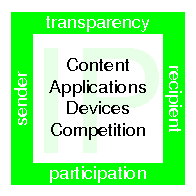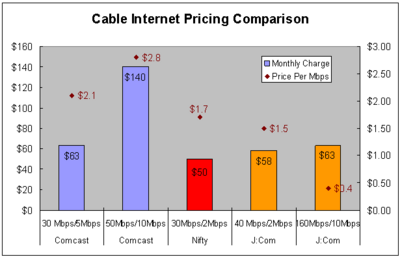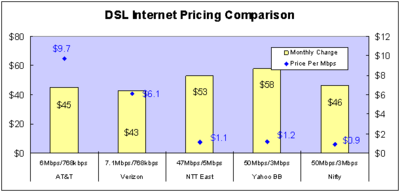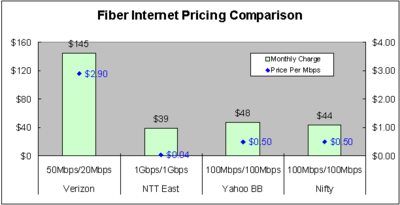It does seem to clarify some of the points made by the panelists.
Tag Archives: Broadband
More Liveblogging from NANOG Net Neutrality Panel
Question from a provider: VoIP traffic prioritization from essentially our own service?
Moderator: One thing that won’t be allowed is prioritizing your own service over someone else’s similar service; that’s almost the whole point. FCC person: This is contemplated in the document. Existing services wouldn’t have to be reworked rapidly. Seeking input. Reasons to be concerned. Monopoly over last mile has a position to differentially treat such a service. This is one of the core concerns.
Q: Giving the same priority to somebody else’s similar VoIP service is essentially creating a trust relationship; how much traffic will the other service provider send? Continue reading
Liveblogging from NANOG Net Neutrality Panel
A huge number of comments have been received already, by Jan 15 deadline. More comments are solicited. See also openinternet.gov.
The general idea is to take six proposed principles and turn them into rules that are enforceable and not unreasonable:
The first four principles have been around for several years. The last two, nondiscrimination and transparency, are the same as the ones Scott Bradner’s petition recommended back in June 2009. Back then I mentioned as I always do that the FCC could also stop talking about consumers and talk about participants. Interestingly, their slide at this talk did not use the word “consumer”, so maybe they’ve gotten to that point, too.Proposed Rules: 6 Principles
- Access to Content
- Access to Applications and Services
- Connect Devices to the Internet
- Access to Competition
- Nondiscrimination
- Transparency
The FCC is also making a distinction between broadband and Internet. There are existing rules regarding “managed” vs. “specialized services” for broadband Internet access, but for net neutrality in general, maybe different rules are needed. Continue reading
R.E.A. for Fast Internet Everywhere
The R.E.A. produced more than electricity. “Truly, Roosevelt endeared himself to Georgians”, and to the rest of rural America, making the rest of FDR’s New Deal much easier to sell. Read the rest of FDR’s speech: that’s exactly what he’s doing; using the R.E.A. t o sell the New Deal.It was Roosevelt himself who linked the country’s rural electrification program to his adopted hometown of Warm Springs, Ga. In an August 11, 1938, speech at Gordon Military College in Barnesville, Roosevelt spoke at the dedication of Lamar Electric Membership Corporation (now Southern Rivers Energy). His comments there immortalized the impact the president’s connection with rural Georgia had in illuminating the nation’s farms and country back roads. “Fourteen years ago, a Democratic Yankee came to a neighboring county in your state in search of a pool of warm water wherein he might swim his way back to health,” Roosevelt said before a crowd of 20,000 that summer day. “The place, Warm Springs, was a rather dilapidated, small summer resort. His new neighbors extended to him the hand of genuine hospitality, welcomed him to their firesides and made him feel so much at home that he built himself a house, bought himself a farm, and has been coming back ever since.”
Truly, Roosevelt endeared himself to Georgians. He continued his speech with the following words, which have been quoted countless times in promoting Warm Springs, the Little White House and Georgia’s EMCs: “There was only one discordant note in that first stay of mine at Warm Springs: when the first-of-the-month bill came in for electric light for my little cottage, I found that the charge was 18 cents a kilowatt-hour about four times as much as I paid in Hyde Park, New York. That started my long study of proper public utility charges for electric current and the whole subject of getting electricity into farm homes. So, it can be said that a little cottage at Warm Springs, Georgia, was the birthplace of the Rural Electrification Administration.”
We have a similar situation today with high speed Internet and rural America. Republicans controled Congress and the White House for 8 years and the U.S. fell behind. Democrats want to pass the equivalent of another New Deal. High speed Internet access everywhere would have the effect the R.E.A. had in the 1930s.
Plus more: the Internet is the printing press, the telephone, the telegraph, the radio, and the TV of the 21st century. Without it, people can’t even download the PDF of the CWA report that shows how far behind they are, much less YouTube, facebook, blogs, and access to diverse news sources throughout the world, not to mention the text of every bill in Congress and the voting records of every Congress member, as well as who their campaign contributors are. Those of us with Internet access take those things for granted.
Those without still mostly depend on one local newspaper and TV news for their information. Well, that plus chain emails for those who have dialup. With newspapers failing and TV news controled by a handful of companies, without the Internet there is no free press. Without a free press there is no democracy.
As FDR said in 1938:
Yes, electricity is a modern necessity of life (and) not a luxury. That necessity ought to be found in every village, in every home and on every farm in every part of the wide United States.The same is true of high speed Internet access in 2009.
We need high speed Internet access everywhere for economic progress, national competitiveness, and for democracy. And yes, since the Internet is a huge source of recipes, for mom and apple pie! In south Georgia, even for okra fritters! All the Internet you can eat: how’s that for a slogan?
Japan Still Far Ahead of US in Internet Connection Speeds
But in Japan cable Internet service is of declining popularity, because 30 or 40 Mbps for $50 or $60 per month is not really fast there.
DSL in Japan goes up to 50 Mbps for also around $50-$60/month.
But for actual fast, cheap, Internet connections, people in Japan buy Fiber to the Home (FTTH), which actually costs less and delivers from 100Mbps to 1Gbps.
Meanwhile, back in the U.S.A., EDUCAUSE has proposed 100Mbps national broadband using a funding method that already failed in Texas.
Japan didn’t get to 100Mbps by a single government-funded network. It did it by actually enforcing competition among broadband providers. Why did it do this? Because a private entrepreneur, Masayoshi Son, and his company Softbank, pestered the Japanese government until it did so.
Thus it’s refreshing that these graphs laying out how far ahead of the U.S. Japan is come from the New America Foundation. Chair? Eric Schmidt, CEO of Google.
Internet, Not Broadband, for National Policy
 A national broadband policy is what you get when you put bellheads in charge.
Fortunately, Scott Bradner has been on the Internet since the beginning,
and explains the difference.
A national broadband policy is what you get when you put bellheads in charge.
Fortunately, Scott Bradner has been on the Internet since the beginning,
and explains the difference.
Broadband is not the Internet. Broadband is shorthand for a diverse class of wired and wireless digital transmission technologies. The Internet, in contrast, is a set of public protocols for inter-networking systems that specifies how data packets are structured and processed. Broadband technologies, at their essence, are high-capacity and always-on. The essence of the Internet is (a) that it carries all packets that follow its protocols regardless of what kinds of data the packets carry, (b) that it can interconnect all networks that follow those protocols, and (c) its protocols are defined via well-established public processes.It’s a petition. Please sign it.There’s risk in confusing broadband and Internet. If the National Broadband Plan starts from the premise that the U.S. needs the innovation, increased productivity, new ideas and freedoms of expression that the Internet affords, then the Plan will be shaped around the Internet. If, instead, the Plan is premised on a need for broadband, it fails to address the ARRA’s mandated objectives directly. More importantly, the premise that broadband is the primary goal entertains the remaking of the Internet in ways that could put its benefits at risk. The primary goal of the Plan should be broadband connections to the Internet.
-jsq
PS:
Therefore, we urge that the FCC’s National Broadband Plan emphasize that broadband connection to the Internet is the primary goal. In addition, we strongly suggest that the Plan incorporate the FCC Internet Policy Statement of 2005 and extend it to (a) include consumer information that meaningfully specifies connection performance and identifies any throttling, filtering, packet inspection, data collection, et cetera, that the provider imposes upon the connection, (b) prohibit discriminatory or preferential treatment of packets based on sender, recipient or packet contents. Finally, we suggest that the Internet is such a critical infrastructure that enforcement of mandated behavior should be accompanied by penalties severe enough to deter those behaviors.While you’re at it, urge the FCC to stop talking about “consumers” and start talking about participants.



